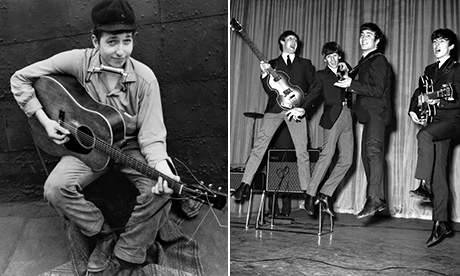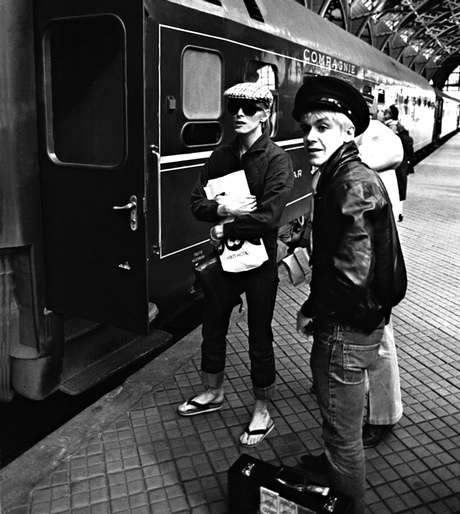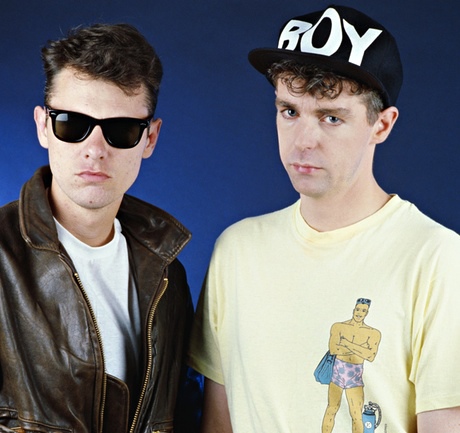When Dylan met the Beatles – history in a handshake?
Fifty years ago this week the Beatles and Bob Dylan got together to share a few joints – and the world of music was never the same again. Or so the story goes. But does pop culture really work like that?
Andrew Harrison
The Guardian
Wednesday 27 August 2014
Just as a stopped clock tells the right time twice a day, the 50th anniversary of a major Beatle-related happening comes around every other week in 2014. Friday marks one of the bigger half-century landmarks, and the birth of a way of looking at rock music that just won't go away. On Friday 28 August 1964, in a room in the Delmonico hotel at Park Avenue and 59th in New York City – at a rendezvous brokered with a keen eye to a story by journalist, mutual friend and assiduous self-publicist Al Aronowitz – the Beatles encountered Bob Dylan for the first time.
Here the folk-singing scarecrow-prophet introduced the excitable Scousers to marijuana for (allegedly) the first time. Ringo Starr, the first to be offered a smoke and ignorant of dope etiquette, chugged through that first joint like a stevedore attacking his first Woodbine of the morning and collapsed in a giggling mess. Brian Epstein became so stoned he could only squeak,"I'm so high I'm up on the ceiling." Paul McCartney believed he'd attained true mental clarity for the first time in his life and instructed Beatles roadie and major-domo Mal Evans to write down everything he said henceforth. Dylan, meanwhile, lost his cool and began answering the hotel phone by shouting, "This is Beatlemania here!" Otherwise they drank wine and acted the goat, like bands do.
The post-game analysis was that, the doors of their perception not so much cleansed as kicked to matchwood and burnt, the Beatles then left behind childish things and set out on the road to enlightenment, serious artistry and self-expression at all costs. Exposed to the Beatles, Dylan would go on to create folk-rock and import the social conscience of traditional American music into the rock arena, thereby providing the counterculture with its national anthems.

Kicking down the doors of perception … Bob Dylan and the Beatles. Photograph: Getty
Never ones to undersell their achievements, baby boomers subsequently promoted this fairly shambolic Beatles-Dylan hangout as a decisive summit, a defining event of rock culture. "Until the advent of rap, pop music remained largely derivative of that night at the Delmonico," Aronowitz would later proclaim. (Goodnight, soul, funk and disco; back in your box, James Brown and Kraftwerk.) "That meeting didn't just change pop music – it changed the times."
The truth, inevitably, is more prosaic. "The meeting was a game-changer," says Mark Ellen, co-founder of Mojo and Q magazines, "but it wasn't the instant dramatic meeting of superpowers that people imagine." The two parties had already regarded one another with envy long before they met. The Beatles were becoming tired of screaming teenage fans and life as a group, just as Dylan was becoming enamoured of exactly those things. "At the Delmonico," says Ellen, "they were passing one another at a time when each of them would quite liked to have been the other one."
Afterwards, the Beatles began to mine their own interior lives for personal, self-examining songs like Michelle and Yesterday. Dylan made 1965's Bringing It All Back Home album, half of which featured a rattling full electric-rock group, to the horror of the turtleneck crowd. "These changes were probably going to happen anyway," Ellen argues. "And the Beatles and Dylan were eventually going to meet because they had to meet, just as the Beatles had to meet Elvis eventually. They were the biggest things on the planet at the time."

David Bowie and Iggy Pop Photograph: Jan Persson/Redferns
Yet the idea of an ultimate turning point, a fork in the woods, a Zarathustra moment where everything changes, persists. It plays to the pop fan's weakness for a version of the "great man" theory of history – the notion that everything depends on this one decision or that single conjunction – and connects to the lure of the counterfactual. (What if Kurt Cobain had lived?) If the Beatles and Dylan stories are modern myths, then the Delmonico hotel meeting becomes that most modern and meta of all pop events, a crossover episode. It's Sherlock meets the X-Men, it's England meets America, it's Dylan's adopted dustbowl past meeting the Beatles' democratised hyper-pop future, one side nourishing the other. You can see where this sort of thinking leads a person.
In which case, maybe it's sad that pretty much every fateful encounter in music turns out not to be quite so singular after all. Take, for instance, the case of Keith Richards and Mick Jagger. They first run into one another on the platform at Dartford station in October 1961. Mick is carrying a clutch of rare blues records, Keith a hollow-bodied Hofner cutaway guitar. They recognise kindred spirits, fall to talking about music and within a year have formed the Rolling Stones. A prime Sliding Doors moment, you'd think.
Except that they already knew each other from primary school. And the London blues scene that gave birth to the Stones was such a small one that, even separately, Richards and Jagger would surely have gravitated to Alexis Korner's Ealing jazz club and therefore Charlie Watts, Ian Stewart and finally Brian Jones. Maybe events would have corrected themselves, as they do in science fiction.
David Bowie meeting Iggy Pop at Max's Kansas City club in 1971, without which no Raw Power, no Ziggy Stardust and therefore, arguably, neither glam-rock nor punk? It was hardly a chance meeting. Bowie, besotted with the Stooges, had made a point of seeking out Jim Osterberg and Lou Reed, too.
You could say that Roger Daltrey spotting Who bass player John Entwistle in the street really was a lucky coincidence. ("I hear you play bass," the singer reputedly said, an astute observation given that Entwistle was actually carrying one at the time.) But even the most dedicated Who fanatic would find it hard to argue that this providential encounter determined the band's future. Whoever played bass, the Who would still be the Who.
Morrissey meeting Johnny Marr? The guitarist tramped over to Stretford specifically to knock on the future Heaven Knows I'm Miserable Now hitmaker's door and demand that they write songs together (plus they'd already met once at a Patti Smith concert). Clash manager Bernard Rhodes spotting John Lydon on the King's Road in an "I Hate Pink Floyd" T-shirt? The incestuous London pre-punk scene of 1975 would surely have brought Lydon and the Sex Pistols together eventually. Simon and Garfunkel? Met at elementary school. Pete Doherty and Carl Barât? Who cares?

Chris Lowe and Neil Tennant Photograph: Fabio Nosotti/Corbis
Pretty much the only serendipitous meeting that stands up is that between Pet Shop Boys Neil Tennant and Chris Lowe, who happened upon each other in a hi-fi shop on the King's Road in August 1981, got talking about music and were writing songs together within a week. Yet both were habitués of London clubland and would surely have got together sooner or later anyway.
Just as we no longer think that the assassination of Franz Ferdinand "caused" the first world war, perhaps we only imagined that unrepeatable meetings between supernatural talents shaped our music culture. Meanwhile, the very notion of a meat-space encounter between opposing talents is disappearing as collaborations take place virtually. The 50th anniversary of Kanye West dropboxing a file to Daft Punk is unlikely to be celebrated. And that's probably a good thing.

No hay comentarios:
Publicar un comentario